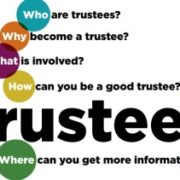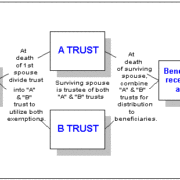Unique Needs, Unique Solution: Supplemental Services Trusts
As with most persons with special needs and disabilities, the name of the game is to pay it forward. Unplanned and unthought out self-sacrifice, however, are rarely the proper ways to go about anything. Unfortunately, those families with loved ones with particularly debilitating diseases or affiliations are often solely focused on the here and now in terms of providing care. When asked, was about in 10 years? Or what about when you pass or are too old or sick yourself to provide care, what then? Regularly, these questions, though critically important, are pushed aside because to answer them would require tough choices to be made. Often these families fall back on pithy and often callous responses. Responses such as, “everything will be fine as long as my child dies before I do” or “my other, more typical children will shoulder the burden and take care of their special needs sibling.”
Special Needs Trusts in a Nutshell
Special Needs Trusts are private agreements that allows a third party, a trustee, usually the family, to manage the assets that are placed inside the trust for the benefit of trust beneficiaries, the special needs person. There are many types of trusts, each with own its unique legal conventions and uses. The critical aspect of trusts in this circumstance is that the assets housed within them usually aren’t counted as a part of the trust beneficiary’s taxable estate. Thus, the resources placed within these trusts can be managed for the benefit of a person with special needs but still allow them to qualify for public benefits like supplemental security income, Medicaid, and other local and state government benefits. This allows grantors, those who create the trust, to provide much need stable and monetary support while still allowing often indispensable social assistance programs for their children, even long after the parents pass. Critically, these trusts seek to supplement income from assistance programs not to replace it, which is important in the eyes of the government because if a family, and by extension a special needs person, can provide for themselves than they don’t need assistance programs. This theory is echoed in the needs and health-based requirements of many, if not all, assistance programs. The rules and requirements for local, state, and federal government assistance programs can be confusing, contract a local Cleveland area estate planning attorney today to make sure you’re informed enough to make the right choices.
Supplemental Services Trusts
Per O.R.C. § 5122-22-01(D), trusts for supplemental services, denotes the primary requirements of these trusts which allow special needs persons to benefit from them while also receiving government benefits:
“(D) Supplemental services. (1) Supplemental services are expenditures, items or services which meet the following criteria:
(a) The services are in addition to services an individual with a disability is eligible to receive under programs authorized by federal or state law or regulations, and the services do not supplant services which would otherwise be available without the existence of the trust;
(b) The services are in addition to basic necessities for such items as essential food, clothing, shelter, education and medical care, and the services are in addition to other items provided pursuant to an ascertainable standard; and
(c) The services are paid for with funds distributed pursuant to a trust which meets the requirements of section 5815.28 of the Revised Code or with funds distributed from the supplemental services fund created in section 5119.51 of the Revised Code, and the services would not be available without payment from the trust or fund.
The two main takeaways from this passage is that 1) the trust services do not replace government benefits and 2) a supplemental services trusts is the only way a special needs person would get these additional benefits.
In nutshell, a supplemental services trust is for individuals who are eligible to be served by the Ohio Department of Mental Retardation, a county board of mental retardation and developmental disabilities, the Ohio Department of Health, or a board of alcohol, drug addiction, and mental health services. With this trust, trust beneficiaries must be vetted and approved by the State Department of Disabilities or the County Board of Developmental Disabilities. The trust estate, i.e. stuff placed in trust, as of 2015, cannot exceed $242,00o. Further, Ohio law is strict that the trust assets are used only for supplemental services, those services not provided by government assistance programs. Additionally, another hardpoint with these trusts is that upon the death of the beneficiary, a portion of the remaining assets, which must be at least 50 percent of the remaining balance, must be returned to the state of Ohio to be used for the benefits of others who do not have such a trust. Thus, pay it forward, at least in this circumstance, is written in the rock of Ohio law.
So why use a Supplemental Services Trust?
Again, the best way to demonstrate the value of these trusts is to go into the Ohio code. Per Per O.R.C. § 5122-22-01 (D)(2):
Supplemental services…include, but are not limited to, the following:
(a) Reimbursement for attendance at or participation in recreational or cultural events;
(b) Travel and vacations;
(c) Participation in hobbies, sports or other activities;
(d) Items beyond necessary food and clothing (e.g., funds for dining out occasionally, for special foods periodically delivered, or for an article of clothing such as a coat which is extra but which is desirable because it is newer, more stylish, etc.);
(e) Cosmetic, extraordinary, experimental or elective medical or dental care, if not available through other third party sources;
(f) Visiting friends, companionship;
(g) Exercise equipment, or special medical equipment if not available through other third party sources;
(h) The cost differential between a shared room and a private room;
(i) Equipment such as telephones, cable television, televisions, radios and other sound equipment, and cameras for private use by the individual;
(j) Membership in clubs such as book clubs, health clubs, record clubs;
(k) Subscriptions to magazines and newspapers;
(l) Small, irregular amounts of personal spending money, including reasonable funds for the occasional purchase of gifts for family and friends, or for donations to charities or churches;
(m) Advocacy;
(n) Services of a representative payee or conservator if not available through other third party sources;
(o) Guardianship or other protective service listed in paragraph (C)(9) of this rule;
(p) Someone other than mental health community support staff members to visit the individual periodically and monitor the services he receives;
(q) Intervention or respite when the person is in crisis if not available through other third party sources;
(r) Vocational rehabilitation or habilitation, if not available through other third party sources;
(s) Reimbursement for attendance at or participation in meetings, conferences, seminars or training sessions;
(t) Reimbursement for the time and expense for a companion or attendant necessary to enable the individual to access or receive supplemental services including, but not limited to, travel and vacations and attendance at meetings, conferences, seminars, or training sessions;
(u) Items which medicaid and other governmental programs do not cover or have denied payment or reimbursement for, even if those items include basic necessities such as physical or mental health care or enhanced versions of basic care or equipment (e.g., wheelchair, communication devices), and items which are not included for payment by the per diem of the facility in which the beneficiary lives; and
(v) Other expenditures used to provide dignity, purpose, optimism and joy to the beneficiary of a supplemental services trust.
From the extensive list of available uses for trust assets for special needs persons, it is no surprise that those persons with those trusts live and much more comfortable and fulfilling life than those without. Additionally, these trusts shoulder the burden for parents and sibling for providing much need support and care while also acting as a tool for benefit preservation. There are many options available for those family members with special needs persons, talk to an experienced Ohio area estate planning attorney to find out the best options for your family.










